Back in 2013, I was really proud to become one of the first Google Partners in Belgium.
When I got that badge, I plastered it everywhere I could: on my site, in presentations, bios and even in client proposals.

Not that potential clients ever bothered to ask about it.
But I told them anyway: what the Google Partner program entailed, what requirements you had to meet, and how not everyone could qualify for it.
Besides these imaginary benefits, being part of the program was pretty useful at first.
I had an account rep at Google that was really helpful and got a lot of training and support that helped me to grow my business.
But over time, the program has gotten a lot less useful.
And today, I feel that being a Google Partner actually hurts the work you do for clients.
So whether you’re considering to become a Google Partner, or you’re a company looking to hire a new agency to run your Google Ads campaigns, there are some important details to know!
Let me tell you all about them!
Table of Contents
What is the Google Partner program?
There are millions of businesses using Google Ads, which makes it hard for Google to manage them individually.
Enter Google Partners.
These are agencies, consultants or freelancers that do the following for Google:
- Client acquisition: a web design agency might convince a client to also start running Google Ads to their brand new website
- Support: Partners take care of first-line support, they answer client questions and figure out how to fix operational or technical problems
- Account management: keep the client and expand the revenue through upsells (increase ad spend) or cross-sells (run other types of campaigns)
Google Partners don’t this for charity, most of the things that are interesting to Google, also make the Partner more money.
But there are a couple of extras advantages they get thanks to the Google Partner Program:
- A framework to prove their skillset: certifications
- Support in improving up their skillset: understanding new ad formats, better account optimization, etc.
- Business support: training and coaching on pricing, effective consulting, etc.
- Football tables, mini-fridges, and tablets (these are the prizes as part of the competitions)
Starting out, Google invested heavily in the program. I remember an amazing coaching session with Alex Langshur from Cardinal Path, which had a huge impact on my consulting work.
But for some reasons (organizational restructure, budget cuts, targets not met?), the Google Partner Program got less love internally.
Support was moved to an outside partner, then brought back in-house, then outsourced completely.
This really removed the feeling of being an actual partner, to being used as a resource to meet a target.
Shifting Requirements
All the changes had left me with a “meh” feeling about the Google Partners program these last couple of years.
But a revision of the program’s requirements in early 2020 put the final nail in the coffin for me.
After backlash from the PPC community, Google loosened its requirements around the number of certified users and gave the option to dismiss recommendations.
Here are the requirements to qualify as a Google Partner in 2023:
- Performance: min of 70% optimization score across linked accounts
- Spend: minimum of $10,000 in the last 90 days
- Certifications: min 50% of account strategists certified + certifications in all areas with min $500 ad spend
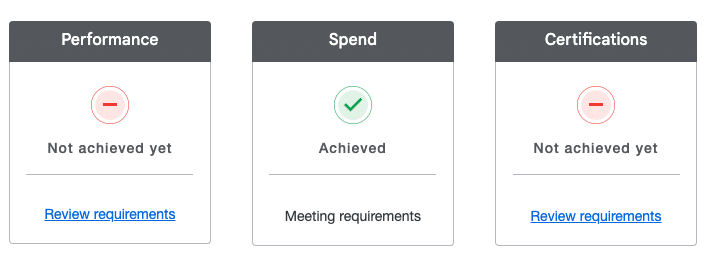
Let’s look at these changes in more detail.
1 – The Almighty Optimization Score 🤬
Google has always had a “Performance” component as part of the Google Partner badge.
It used to include a bunch of best practices like adding negative keywords, sitelinks, different keyword match types, bid adjustments, to the accounts you manage.
Here is how Google still defines “good performance”:
Ensure that you can effectively set up and optimally run Google Ads campaigns to achieve the greatest results for your clients
In the 2020 update, “Performance” changed and is now focused on “Recommendations”. This is the thing that’s caused me to write this post and actively come out against the Google Partner program.
Recommendations
Not all recommendations are bad, but many of them aren’t exactly tailored to a specific campaign. The common theme behind a lot of them is about increasing ad spend and the adoption of new features. Both which are great for Google, but necessary for the advertiser.
Take a look at these 3 recommendations I just pulled from a client’s account:
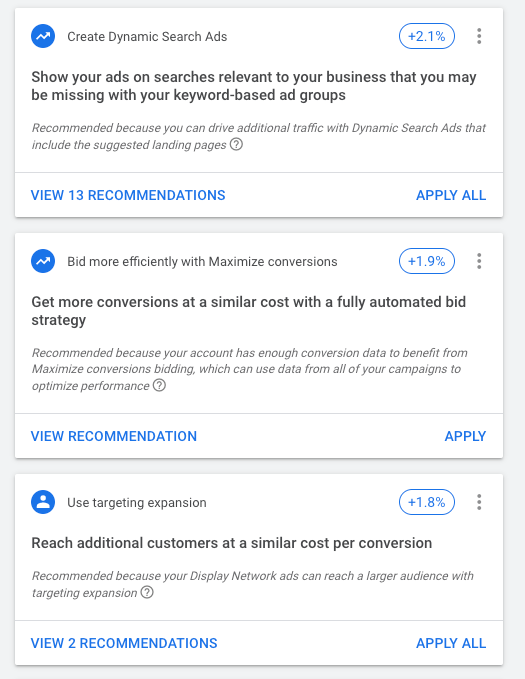
- Create Dynamic Ads
- Use Maximize conversions as a bidding strategy
- Use targeting Expansion in my remarketing campaign
While these could be good suggestions, they are not relevant in these campaigns because I know they won’t achieve my client’s goals.
Sometimes I might use a recommendation, but as someone that gets paid to manage campaigns for a client, your obligation is to the client, not to Google.
This is all reflected in the Optimization Score:

The first thing to mention about the Optimization Score is: this score doesn’t have anything to do with the actual performance of the account.
It’s a vanity metric.
I have a campaign that’s delivering amazing results and it has a score of 13.8%.
So using the “OptiScore” as the main metric to optimize your account is clearly the wrong move.
One of the requirements is that the average Optimization Score of accounts linked to your MCC needs to be above 70%.

You have two options to hit that score:
- Apply all recommendations
- Dismiss them
In the initial announcement, Google stated that dismissals wouldn’t count towards your score. In their 2021 revision they do allow it.
This also hollows out this part of the requirements. If you can simply ignore everything, what’s the point of having it there?
2 – More Skillshop Certifications
Before you needed at least 1 person to get a Google Ads certification, today you need to have 50% of your Company Account Strategists.
The initial overhaul of the Partner program had as a requirement that 50% of users linked to your the Google Ads manager account (MCC) needed to be certified.
That raised a lot of concerns.
Like this one:
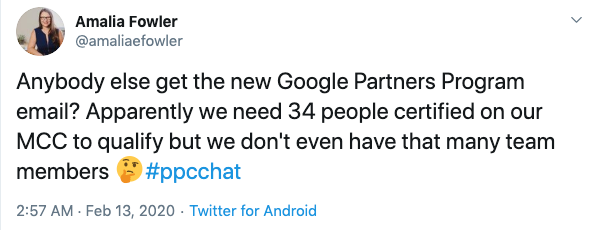
An update is now that you can indicate how many Company Account Strategists you have:
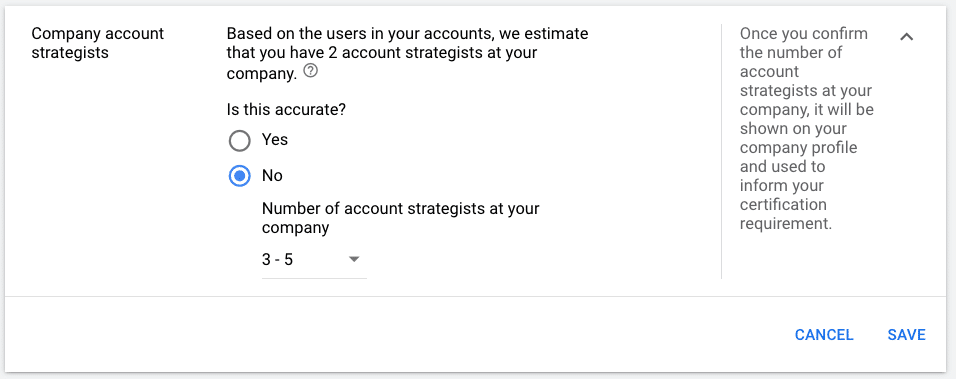
This is a good update, because you can indicate how many people actually work on the account, as opposed to a manager or boss that has view access.
Then only 50% of the people that work on the account will need to be certified.
And in a 2023 update, you now need to have one certified user for every part of your account that has spent $500 USD in: Google Ads Search, Google Ads Display, YouTube Ads, and Shopping ads.
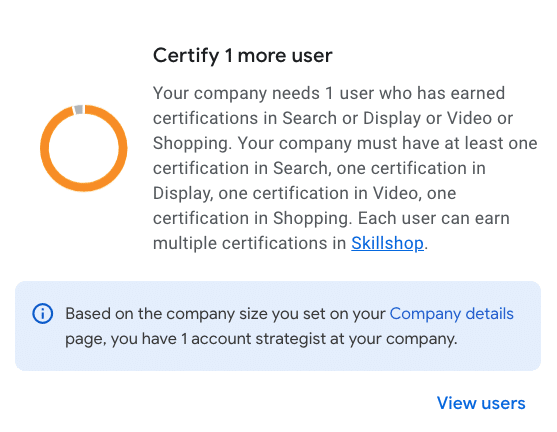
In order to become certified, I would need to get a Display and Video certification.
Is the Google Partner Programs Still Worth It?
Ok, Dennis, with all this hate of the Google Partners program, what’s your alternative?
If you get paid to manage Google Ads, there is only one thing important:
PUT YOUR CLIENT FIRST
No matter how many free tablets, air hockey tables or drinks Google sponsors, you are responsible for doing the things that achieve for your clients first.
Update December 2020: After a suggestion from one of our readers, we’ve launched a Google Partner alternative: The Clients First Club. There is also a badge, but the requirements make a lot more sense. Join us!
Google Ads Support For Outsiders
Google distinguishes three tiers of users: Members, Partners & Premier Partners.
For those claiming to have special support, because they are a Google Partner, this overview from Google’s website contradicts that:
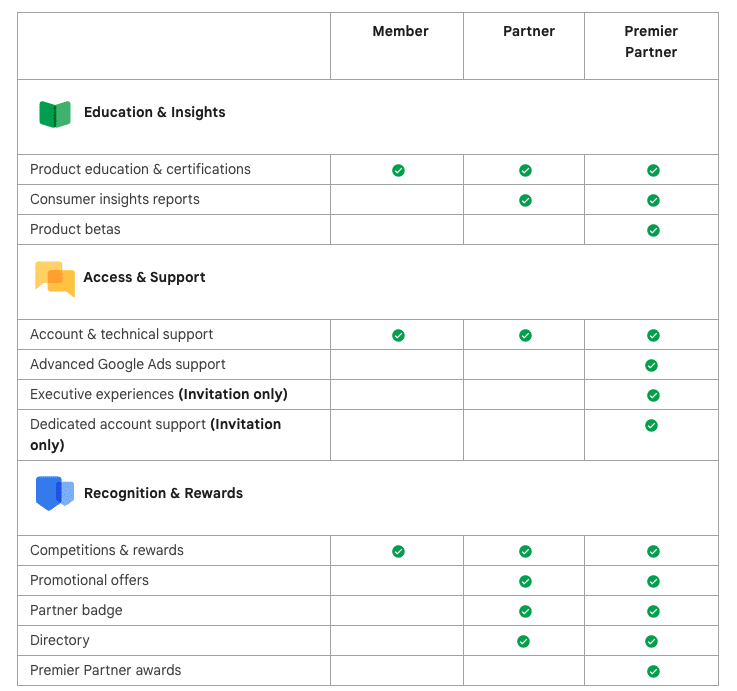
Both “Members” and Partners get similar support.
I haven’t been an official Google Partner for a while, and I’ve found them to be just as helpful as before.
Beta invites
As a Google Partner, you hear more often about what Google is up to a little earlier than others.
Sometimes this allows you to opt your clients into new beta programs that have the potential to be very lucrative because you’re the first advertiser using these features.
But when those features are rolled out globally, that advantage goes away pretty quickly.
I also want to say that I’ve been able to join to a couple of beta programs via regular support.
The problem is that these beta features often have an NDA associated with them. So if no-one is talking about it, it’s hard to know they exist in the first place 🙂
One source for beta info is Google reps (the good ones). They are focused on growing the spend of a particular account and don’t really care about the Partner status of the person managing it.
Getting certified and finding new clients
To distinguish yourself from others, you’ll need to do a lot better than slapping the Google Partner badge on your website.
If that was your strategy for finding new clients, your business probably isn’t booming.
Most clients don’t care either:
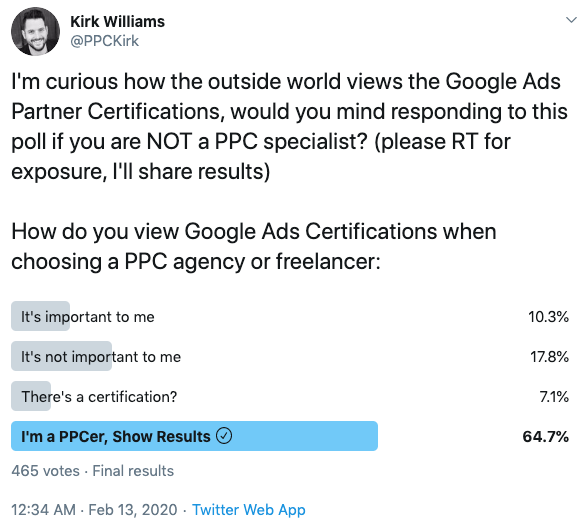
The certifications part of the Partner program requires an absolute basic level of Google Ads knowledge. You can get certified without ever having managed a single campaign in your life.
So instead of focusing on the theory, start doing the actual work. Leverage that works into real case studies you can share in an article or as a speaker at a local event.
If you don’t feel ready yet to handle clients, consider a course that will teach you how to get results, not just make Google more money!
What About The Premier Program?
Premier Google Partners need to meet all of the regular Google Partner requirements, AND be in the top 3% of all partners in a country.
This 3% is across a number of different areas:
- Client growth: get clients to spend more and signup clients new to Google Ads
- Client retention: get clients to stick around
- Product diversification: don’t just limit your campaigns to Search but also run Shopping, Display, App or Video campaigns
- Annual ads spend: total spend across accounts
I haven’t been a Premier Partner, so can’t really say if it’s worth it or not.
But by the nature of being in the top 3%, businesses that qualify for this manage a lot of clients and campaigns.
That doesn’t mean they’re any good, but you at least know that you won’t be someone’s first client 😅
What do you think about the Google Partner Program? What benefits is it giving you?
